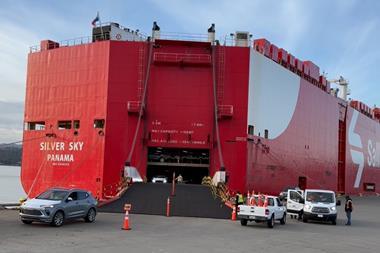
Further details have come to light about the politically-fuelled dispute between Russia and Poland that affected the issue of third-country haulage permits for car carriers last month (read more here). They include the impact of fuel duty prices, restrictions on transit through the Czech Republic and tariff increases. And, according to logistics provider Gefco, the situation now means that it is more difficult to guarantee timely deliveries.
The request from Russia’s Ministry of Transport in January for a reciprocal increase in the number of multilateral EKMT permits for transiting freight to the capital through Belarus was refused by Poland following its initial demand for a 2.5x increase of its own. Russia then cancelled all licence allocation with the consequence that trailer rates increased dramatically, with figures quoted ranging between 30-50% according to some industry sources.
Many logistics operators were forced to look for alternative routes and at the same time struggled to find adequate capacity because trucks that had delivered freight between 1-15 January were blocked on the border by the dispute over the permits. It was expected that the problem would be resolved before the end of the Russian holiday but was only finally sorted out on February 3rd, with a considerable backlog to deal with.
The problem was exacerbated by the fact that many had significantly reduced their fleets during the economic crisis. In addition, the big rise in diesel between December 2010 and January this year (more than 14.5% in Russia) meant that finding longer alternative routes became excessively costly.
According to Gefco, which has subsidiary activity in both Poland and the new Russian Customs Union, the problems highlighted by the recent crisis are indicative of a more problematic situation for logistics providers operating between the two countries.
For one thing, the reduction in the number of multilateral permits issued by the Association of International Road Carriers (ASMAP) has cut the number of car carriers eligible for legitimate transit.
“Since 2011 these permits can't be issued for Euro-3 vehicles, and the number of permits issued for Euro-4 and Euro-5 vehicles is five times less than in 2010,” Gefco Russia’s overland manager, Olga Kalinina, told Automotive Logistics News.
Tax and access restrictions
Another problem is that the changes in Russia’s tax law, which came into effect in January, now makes it necessary for a TIR Carnet to be issued at the place of loading, which restricted involvement of the transport companies from the third countries for transit from Central and Western Europe.
As was previously reported by Automotive Logistics News, certain hauliers were alleged to be rewriting the cross-border transport documents to show that the freight had been loaded in Poland even if it had originated from other EU countries of origin.
The restriction of transit through the Czech Republic since February 1st 2011 has also had a negative impact on Russian operators during the dispute, said Kalinina, adding: “All those factors caused interruptions in scheduled supplies. The general shortage of transport capacities led to significant increase in tariffs for international deliveries.”
Limited capacity
According to Gefco, Polish operators have the advantage of more modern fleets and lower tariffs over their Russian counterparts. (Though, as was reported last week, in terms of fleet investment some Russian providers are now starting to rectify this imbalance – read more here).
“Russian transport companies have always been our major partners, but their fleets have limited capacity,” said Gefco. “Most of it consists of the standard trucks, but for international deliveries so-called megatrucks (100m3 /3m height) are more often required for the automotive sector where Gefco mostly operates. Now, with high export and import growth, Russian operators do not have enough transport capacity to satisfy the demand for international deliveries, especially during the post-crisis period when many companies could not survive in terms of severe dumping.”
However, the current situation, including reduced number of permits, has created advantages for the Russian operators at the same time that it shrank opportunities for those in Poland.
Time and tariffs
These limited opportunities have led to tariff increases according to Gefco.
“Today no one can guarantee the stable tariffs for longer than three months,” said Kalinina. “Usually the logistical expenses are planned for a year ahead. But none of our clients took account of the risk of quarterly tariff increases.”
Gefco’s international scope meant it was able to adopt some new routes via Ukraine and the Baltic States and strengthen its position for ferry and railway delivery.
Rail was also the solution that Polish carrier Adampol chose to respond to the recent crisis.
“Adampol increased the number of dispatched cars by wagons sending them by rail from Malaszewicze,” said spokesperson Barbara Koncewicz.
Adampol has called for better preparation for the processing of those wagons from Russian rail hubs and customs offices and the implementation of a multimodal type of delivery from the Central Gate entry point to the country.
Adampol launched a new regular rail service last June from its logistics centre in Malaszewicze, on the eastern Polish border with Belarus, for shipment of vehicles to Eastern Europe.
That said, Gefco maintains that overland transport is still the most flexible solution for international deliveries to the Russian Federation.
“The current situation should encourage the Russian companies to enhance their offer and increase their fleets,” Gefco concluded.



































